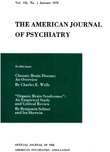ARMY PSYCHIATRY IN KOREA FOLLOWING THE CEASE FIRE AGREEMENT
Abstract
Follow-up findings of 149 psychiatric patients of the 3rd Infantry Division who were evaluated between September 1953 and February 1954 revealed that 77% of patients not in the process of separation at the time of consultation performed duty adequately or better after consultation.
Almost half of the patients given medical clearance for discharge for unfitness (AR 615-368) performed duty adequately or better. Apparently many commanders use this regulation rather effectively as a deterrent to acting out.
One infantry regiment and one specialist battalion had unusually high rates of psychiatric referrals. Other evidence including incidence of sick call visits, new AWOL's, delinquency reports, courts martial, and discussions with officers, patients, and battalion surgeons of these units suggested that they suffered from poor morale which appeared to be directly related to the personality of the commanding officers.
Approximately half of the patients with severe schizoid personalities performed good duty in spite of their defective ego structures.
Most patients with psychogenic somatic complaints functioned adequately or better when returned to duty after a single diagnostic evaluation.
While psychiatrists are often tempted to make predictions regarding a man's potential adjustment, in the present study predictions were highly unsuccessful.
The findings in this paper should serve as a control in any study that reports a high degree of success resulting from a specific treatment program in the realm of military psychiatry.
Access content
To read the fulltext, please use one of the options below to sign in or purchase access.- Personal login
- Institutional Login
- Sign in via OpenAthens
- Register for access
-
Please login/register if you wish to pair your device and check access availability.
Not a subscriber?
PsychiatryOnline subscription options offer access to the DSM-5 library, books, journals, CME, and patient resources. This all-in-one virtual library provides psychiatrists and mental health professionals with key resources for diagnosis, treatment, research, and professional development.
Need more help? PsychiatryOnline Customer Service may be reached by emailing [email protected] or by calling 800-368-5777 (in the U.S.) or 703-907-7322 (outside the U.S.).



